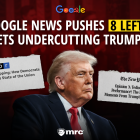The following article is a supplement to the MRC Report: The Biden Administration Waged War on Free Speech with 57 Censorship Initiatives.
The Biden administration was unrelenting in its war against free speech.
Under President Joe Biden, the Office of the Solicitor General launched a four-year-long campaign to convince the U.S. Supreme Court to rewrite the First Amendment so it would instead protect censorship and target free speech.
NetChoice v. Paxton
In response to the pervasive censorship of the Biden era, the state of Texas enacted a public accommodations law limiting large social media platforms’ censoring of Americans’ speech. In NetChoice v. Paxton, Biden’s Solicitor General Elizabeth Prelogar asked the Supreme Court to nullify the Texas law by creating a new constitutional right to censor.
Prelogar sided with NetChoice, a Big Tech trade association which argued that the law should be struck down in its entirety. NetChoice contended Big Tech platforms had an absolute constitutional right to censor other people’s speech — a right that applied even if the censorship was motivated by racial animus.
303 Creative v. Elenis and Judge Lucy Koh
The Biden administration’s atextual argument in Paxton that there exists a First Amendment right to censor was diametrically opposed to the argument it made in 303 Creative v. Elenis.
The 303 Creative case centered around Lori Smith, a custom website designer who did not want to personally design websites for same-sex weddings. Smith differed significantly from the Big Tech platforms in Paxton. She was a publisher, liable for the content on the sites she created. Big Tech platforms, in contrast, claim protections under 47 U.S.C. § 230 (Section 230), which means they are not considered the speakers of the content on their platforms and are generally not liable for what other people post.
Had the Court sided with the administration’s view in 303 Creative, it would have meant that everyday Americans would be required to personally endorse gay marriage, but Big Tech would have carte blanche license to ban individuals for being gay. This is because a ruling by Judge Lucy Koh declared that, under Section 230, Big Tech platforms had a right to ban people for any reason—even sexual orientation or race.
Although Koh’s ruling flew in the face of Section 230’s text, Biden promoted her to appellate justice—the second-highest position in the federal judiciary.

Prelogar not only argued that Big Tech platforms had a constitutional right to censor, but she also insisted to the Court that the Biden administration could instruct platforms to censor.
In Murthy v. Missouri, Prelogar claimed administration officials were entitled to secretly threaten Big Tech platforms with adverse regulatory action if they did not censor Biden’s political opponents. In one instance, Biden’s senior advisor Andy Slavitt threatened Facebook to get it to silence the administration’s opponents, accusing the platform of aiding “insurrection” and remarking “internally, we have been considering our options on what to do.”
In NRA v. Vullo, Prelogar’s office went even further, defending the then-New York Gov. Andrew Cuomo’s explicit debanking efforts. The Cuomo administration had threatened to fine the institutions for an “array of technical regulatory infractions” if they did not “ceas[e] providing insurance to gun groups, especially the NRA [National Rifle Association].”
Prelogar and the Biden administration asked the Supreme Court to disregard centuries of precedent and claim the First Amendment did not prevent government-ordered debanking so long as the person actually carrying out the censorship was not a state employee.
Lindke v. Freed and O’Connor Ratcliffe v. Garnier
In that same judicial session, Prelogar’s office stretched its anti-free speech argument to an even more extreme position. In Lindke v. Freed and O’Connor Ratcliff v. Garnier, the Biden administration told the Court that government officials had a right to block individual Americans’ access to official public statements and even their ability to participate in public hearings and events, so long as said events were held on a Big Tech platform and administered via the bureaucrat’s personal account.
Had the Court accepted the Biden administration’s arguments in Lindke and O’Connor Ratcliffe, then Big Tech firms’ acquiescence would not even be necessary for government agents to silence Americans. The censorship would be valid simply because it occurred over a Big Tech platform.
Moody v. NetChoice
Biden has been an outspoken advocate of draconian campaign finance laws, once claiming he would “eliminate all private dollars from federal elections.” The Office of the Solicitor General dutifully defended Biden’s campaign regulations in the Court.
However, when Florida passed a law clarifying that existing campaign finance laws would apply to Big Tech electioneering, Prelogar — on behalf of the Biden administration — argued that the Court should eliminate the law. In Moody v. NetChoice, Prelogar (siding again with NetChoice) contended that Big Tech did not need to disclose censorship it engaged in for the purpose of influencing elections.
TikTok v. Garland and the Inverse First Amendment
Taken together, the Biden administration’s positions in Murthy, NetChoice, Lindke and NRA would have “invert[ed] the First Amendment,” protecting the right to censor but not the right to speak. The Court rejected this extreme, anti-American position. In late 2024, though, a lower court attempted to impose this new regime anyway in the unrelated case TikTok v. Garland.
In TikTok, two D.C. Circuit judges held that social media platforms had an absolute right to censor that no law could prevent. In that same case, the judges held that the government simultaneously possessed a near limitless “national security” justification by which it could order those same companies to censor others. For good measure, they also invented an extra, new “standing” barrier which curbed the right of censorship victims to seek judicial relief.
On behalf of Biden, Prelogar rushed to the Court—in an expedited, special hearing without normal due process considerations—and asked that it make the lower court’s lawless ruling a binding precedent.
Conclusion
The Biden administration, through its Solicitor General Elizabeth Prelogar, tried to rewrite the Constitution. They attempted to create a First Amendment right under which Big Government and Big Tech could collude to discriminate and to silence Biden’s critics.
Conservatives are under attack! Contact your representatives and demand they investigate Elizabeth Prelogar and Big Tech’s censorship. If you have been censored, contact us using CensorTrack’s contact form, and help us hold government and Big Tech accountable.











